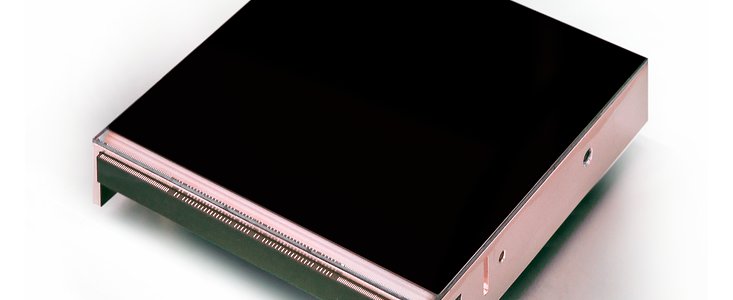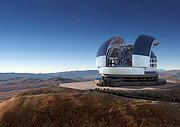Mitteilung
Vertrag für Detektoren von ELT-Instrumenten der ESO unterzeichnet
20. Juni 2018
Die ESO hat mit der kalifornischen Firma Teledyne Imaging Sensors einen Vertrag über den Kauf von Detektoren für den Bau von drei Instrumenten für das kommende Extremely Large Telescope (ELT) der ESO unterzeichnet, das derzeit auf dem Gipfel des Cerro Armazones in Chile gebaut wird.
Dieser Vertrag sichert die hochmodernen Infrarot-Detektionsgeräte, die für den Bau der empfindlichen Augen von MICADO, HARMONI und METIS erforderlich sind, modernste Instrumente, die es Astronomen ermöglichen werden, Galaxien im frühen Universum zu untersuchen, die Sterne und das Gas naher Galaxien zu untersuchen und Exoplaneten mit dem größten optischen/Nahinfrarot-Teleskop der Welt zu charakterisieren.
MICADO, die Multi-Adaptive Optics Imaging Camera for Deep Observations, wird die erste dedizierte Kamera für das ELT sein. Es wird auch spektroskopische Anwendungsmöglichkeiten haben, die darauf ausgerichtet sind, Spektren von kompakten Objekten wie Supernovae zu erhalten. Das Design von MICADO wurde von dem Wunsch nach hoher Empfindlichkeit und hoher Auflösung angetrieben und wird zu einer Kamera mit beispiellosen Fähigkeiten führen. Für den Bau des MICADO-Instruments müssen viele Einzelgeräte zu einem einzigen großen Detektor-Mosaik kombiniert werden.
HARMONI, der High Angular Resolution Monolithic Optical and Near-infrared Integral field spectrograph, wird es dem ELT ermöglichen, Nahinfrarotdaten mittels Integralfeldspektroskopie zu erfassen [1]. Das neue, einzigartige Design von HARMONI macht es einfach zu kalibrieren und zu bedienen und wird die Integralfeldspektroskopie auf ein neues Niveau heben. Das HARMONI-Projekt erfordert auch die Kombination vieler Detektoren zu vier einzelnen Mosaiken.
Das dritte Instrument, METIS, der Mid-Infrarot ELT Imager und Spectrograph, benötigt 5 kleinere Detektoren, von denen vier als Mosaik konfiguriert werden, wobei das fünfte als separate Hochgeschwindigkeitskamera fungiert. Der leistungsstarke Spektrograf des Instruments erlaubt es Astronomen, die Eigenschaften von Exoplaneten zu untersuchen, wie z.B. ihre Bahnparameter, Strukturen, Temperatur und sogar die Zusammensetzung ihrer Atmosphäre.
Alle drei Instrumente sind das Ergebnis langjähriger Entwicklungsarbeit, sowohl bei der ESO als auch in der wissenschaftlichen Gemeinschaft. Mit der Unterzeichnung dieses Vertrages kann mit der Montage der wichtigen zentralen Bereiche dieser hochmodernen Instrumente begonnen werden, womit die ESO der Vollendung des größten Teleskops der Welt einen Schritt näher kommt.
Endnote
[1] Bei der Integralfeldspektroskopie wird das Signal jeder Zelle oder jedes Pixels des Feldes in einen Spektrografen eingespeist, der dann für jedes einzelne Pixel ein Spektrum erzeugt.
Links
Kontaktinformationen
Richard Hook
ESO Public Information Officer
Garching bei München
Tel: +49 89 3200 6655
Mobil: +49 151 1537 3591
E-Mail: pio@eso.org
Über die Mitteilung
| ID: | ann18048 |
Our use of Cookies
We use cookies that are essential for accessing our websites and using our services. We also use cookies to analyse, measure and improve our websites’ performance, to enable content sharing via social media and to display media content hosted on third-party platforms.
ESO Cookies Policy
The European Organisation for Astronomical Research in the Southern Hemisphere (ESO) is the pre-eminent intergovernmental science and technology organisation in astronomy. It carries out an ambitious programme focused on the design, construction and operation of powerful ground-based observing facilities for astronomy.
This Cookies Policy is intended to provide clarity by outlining the cookies used on the ESO public websites, their functions, the options you have for controlling them, and the ways you can contact us for additional details.
What are cookies?
Cookies are small pieces of data stored on your device by websites you visit. They serve various purposes, such as remembering login credentials and preferences and enhance your browsing experience.
Categories of cookies we use
Essential cookies (always active): These cookies are strictly necessary for the proper functioning of our website. Without these cookies, the website cannot operate correctly, and certain services, such as logging in or accessing secure areas, may not be available; because they are essential for the website’s operation, they cannot be disabled.
Functional Cookies: These cookies enhance your browsing experience by enabling additional features and personalization, such as remembering your preferences and settings. While not strictly necessary for the website to function, they improve usability and convenience; these cookies are only placed if you provide your consent.
Analytics cookies: These cookies collect information about how visitors interact with our website, such as which pages are visited most often and how users navigate the site. This data helps us improve website performance, optimize content, and enhance the user experience; these cookies are only placed if you provide your consent. We use the following analytics cookies.
Matomo Cookies:
This website uses Matomo (formerly Piwik), an open source software which enables the statistical analysis of website visits. Matomo uses cookies (text files) which are saved on your computer and which allow us to analyze how you use our website. The website user information generated by the cookies will only be saved on the servers of our IT Department. We use this information to analyze www.eso.org visits and to prepare reports on website activities. These data will not be disclosed to third parties.
On behalf of ESO, Matomo will use this information for the purpose of evaluating your use of the website, compiling reports on website activity and providing other services relating to website activity and internet usage.
Matomo cookies settings:
Additional Third-party cookies on ESO websites: some of our pages display content from external providers, e.g. YouTube.
Such third-party services are outside of ESO control and may, at any time, change their terms of service, use of cookies, etc.
YouTube: Some videos on the ESO website are embedded from ESO’s official YouTube channel. We have enabled YouTube’s privacy-enhanced mode, meaning that no cookies are set unless the user actively clicks on the video to play it. Additionally, in this mode, YouTube does not store any personally identifiable cookie data for embedded video playbacks. For more details, please refer to YouTube’s embedding videos information page.
Cookies can also be classified based on the following elements.
Regarding the domain, there are:
- First-party cookies, set by the website you are currently visiting. They are stored by the same domain that you are browsing and are used to enhance your experience on that site;
- Third-party cookies, set by a domain other than the one you are currently visiting.
As for their duration, cookies can be:
- Browser-session cookies, which are deleted when the user closes the browser;
- Stored cookies, which stay on the user's device for a predetermined period of time.
How to manage cookies
Cookie settings: You can modify your cookie choices for the ESO webpages at any time by clicking on the link Cookie settings at the bottom of any page.
In your browser: If you wish to delete cookies or instruct your browser to delete or block cookies by default, please visit the help pages of your browser:
Please be aware that if you delete or decline cookies, certain functionalities of our website may be not be available and your browsing experience may be affected.
You can set most browsers to prevent any cookies being placed on your device, but you may then have to manually adjust some preferences every time you visit a site/page. And some services and functionalities may not work properly at all (e.g. profile logging-in, shop check out).
Updates to the ESO Cookies Policy
The ESO Cookies Policy may be subject to future updates, which will be made available on this page.
Additional information
For any queries related to cookies, please contact: pdprATesoDOTorg.
As ESO public webpages are managed by our Department of Communication, your questions will be dealt with the support of the said Department.


